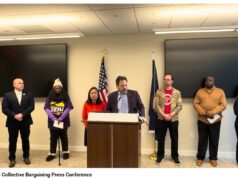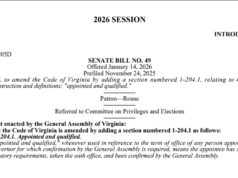by Brian D. Teucke
Collective bargaining is a standard labor practice that allows labor unions to represent employees and negotiate the terms of employee contracts with their employers. Virginia law currently prohibits public sector workers from engaging in this practice.
One page versus sixty-five. That is the difference between the length of a standard educator contract in Virginia versus a standard contract in Pennsylvania, the latter being a state that allows public sector employees to collectively bargain for the terms of their employment. Virginia’s one-page contracts are short for a reason. That is, they are purposely designed to be as vague as possible so as to allow all interpretations of power to fall on the side of the employer and supervisor. The one-page document is also short in length because it does not list any of the rights of the employees or those of an employee’s union. Thus, in order to secure workplace rights, education workers must rely on the charitable benevolence of their boss rather than a legally binding document.
As one of only nine states in America that has banned public sector collective bargaining, Virginia’s education workers currently labor under exceptionally exploitive working conditions. The balance of power between the employer and the employee is so lopsided that Virginia educators often leave work feeling despondent, burnt out, disrespected, and in a state of poor mental health. Further, because educator working conditions are directly linked to student learning conditions, Virginia’s policymakers have jeopardized student learning environments across the Commonwealth.
One page versus sixty-five. This stark contrast goes beyond the depth of a legal document. It reflects the disproportion of workplace power in Virginia’s schools. That is, the boss has all the power, and the workers have none. These conditions are unacceptable, and it is time for a change. Virginia’s educators and students deserve better.
History of the ban
Virginia’s ban on public sector collective bargaining is rooted in the same anti-union traditions that have historically plagued most of the American South. Unlike many Northern states that gave rise to industrialism and the organization of labor, Virginia’s labor union density and distribution has been historically limited because of the Commonwealth’s traditional industries. As such, union culture in the Old Dominion has been mostly weak, misunderstood, and given few legal protections throughout the years. Only in a few pockets of the state have unions thrived or gained public support.
Further, institutional racism and sexism have undergirded much of the anti-union fervor observable throughout the South’s past. Specifically, that whites, people of color, men, women, natives, and immigrants could band together to challenge a white male oligarchy was deeply frightening to those in positions of Southern power. Unionism, by its very definition, breaks down the walls of segregation and replaces it with worker solidarity. Combined with historic racism, anti-union legislation picked up momentum in the wake of the Taft-Hartley Act. In 1947, Governor William M. Tuck signed Virginia’s “right-to-work” bill into law, severely limiting already degraded union rights in the Commonwealth.
In Virginia, racism and Taft-Hartley were not the only forces behind the ban on public sector collective bargaining. The parameters of power placed on Virginia’s local governments are often referred to as Dillon’s Rule and essentially limit localities to powers expressly granted to them by the state. This “rule” is a legal philosophy that has been granted legitimacy through case law and has exercised great influence over Virginia’s politics and legislation. The 1977 Supreme Court of Virginia case, Commonwealth of Virginia v. County Board of Arlington County et al., used the legal philosophy of Dillon’s Rule to declare that because no “express statutory authority” was given, a local governing body or school board could not negotiate and enter into binding collective bargaining agreements. The high court essentially ruled that it was unreasonable to view the right to bargain as an implied power and that there were “no indicators of legislative intent” that might permit such practices.
Sixteen years later, Governor Douglas Wilder signed into law code that reinforced the court’s decision officially banning all public sector employees from collectively bargaining through their local unions for the terms of their contracts. Since then, a bill (HB 852) was introduced in 2008 to repeal the ban on public sector bargaining but failed to attract a co-sponsor or any substantive support from either party. Wilder’s ban and HB 852’s failure moved beyond the blatant racism that buttressed the anti-unionism of the early twentieth century. 1993 and 2008 were reactions that defined the trends of the austerity movement, a myopic obsession that has infected local and state governments across America for the last thirty years. The austerity movement, with all its glittering euphemisms (i.e. “fiscal responsibility”), is decidedly anti-union, anti-collective bargaining, and has been directly influenced by union busting firms, the Chamber of Commerce, and the machinations of activist billionaires like the Koch Brothers. Because unions are the single strongest element in thwarting corporate welfare and the concentration of wealth amongst the 1%, they, and all their functions, have been deliberately targeted. Through the austerity movement, state and local governments openly and cheerfully starve public schools of crucial funding so that tax incentives can be funneled to corporations. Austerity has also given rise to localities that proudly advertise their communities as “low tax” havens while simultaneously starving vital government services of minimum funding. Think of Amazon’s new campus in Northern Virginia or the incoherent diatribe spewed by the Hanover and King William “T.E.A. Parties.”
In the 2020 legislative session, Virginia finally has sponsors for a bill that will repeal the disastrous ban on public sector collective bargaining. Delegate Elizabeth Guzman has just filed that bill- HB 582. Thus, it is important for all Virginians, both those inside and outside public education, both rank and file workers as well as supervisors and school boards to explore why collective bargaining is a win for everyone and why banning it carries unacceptable consequences.
Consequences of the ban
The consequences of Virginia’s ban on public sector collective bargaining are numerous and pernicious. As any working American knows, workplace morale is crucial to any organization’s mission and purpose. Yet, when workers are given virtually no agency over the terms of their employment, their working conditions, and the day-to-day operations at their jobsite, both morale and mission are severely imperiled. With nearly 1,000 teaching positions unfilled across the state, compensation that falls well below the national average, a growing list of responsibilities heaped on the backs of educators, and the demoralizing scrutiny of the SOL testing, Virginia’s public schools cannot afford to introduce any other element into the workplace that jeopardizes worker morale. Sadly, the ban on collective bargaining does just that, adding additional layers of worker exploitation and unfit working conditions that are driving more and more teachers out of the classroom.
The standard contract for a Virginia educator, unlike contracts for educators in 41 other states, does not enumerate an employee’s rights and does not recognize or enumerate the rights of their local union. Further, basic worker rights such as knowing when they will be able to use the restroom, how much planning time they will receive, or when they will be able to leave work are all subject to the discretion of the supervisor. Virginia educator contracts also have an “extra duties as deemed necessary clause” which allows supervisors to delegate tasks to workers that may have nothing to do with their official role and frees the school board from having to compensate educators for these tasks. As one can imagine, these conditions give way to rampant wage theft and unrestrained exploitation. As pressure increases on building level principals from the district or the state, that pressure rolls downhill to the rank and file workers and is absent of a system of checks and balances.
Virginia educators regularly complain of inadequate time to use the restroom, eat their lunch, or even plan their lessons. Because no restraints are placed on administrators, educators are increasingly reporting that they are missing out on spending time with their families because of unpaid meetings and tasks that are mandated to occur after contract hours. Education workers also complain of widespread supervisor bullying, an issue they have little recourse for because most contracts do not permit union representation in potentially contentious “meetings” with supervisors.
Although education workers embrace the hard work and long hours associated with the profession, many become demoralized and exhausted when they are routinely asked to perform an endless list of unpaid tasks at any time their supervisor deems necessary. In other words, for too many, seeing the light at the end of the tunnel is not a daily reality. Rather than their contracts dictating their day-to-day work life, Virginia’s educators labor under the random, unknowable, and often arbitrary mandates of their bosses. It is the rule of an autocrat rather than the rule of law that is supreme in Virginia’s public schools.
How 41 other states benefit from allowing their educators to engage in collective bargaining
In Virginia’s “Standards of Learning” for the Civics and Economics course curriculum, the principles of “checks and balances” and “collaboration and compromise” are identified as prerequisites of responsible government. If Virginia educators are extolling the virtues of these concepts to their students, it is only fitting that educators should enjoy the fruits of those democratic principles in their workplace. Further, teachers are asked to include students in the creation of their lesson plans, so would it not be appropriate for educators to be involved in the creation of their contracts? What type of backwards and hypocritical state would Virginia be to teach their kids one thing and then turn around and do something else?
It cannot be overstated how important collective bargaining is in establishing a more just, democratic, and salutary workplace for Virginia’s educators. But it should also be clearly stated how collective bargaining is a benefit for all parties, not just workers. Employers should rest easy and know that not everything is negotiable in traditional public-school collective bargaining practices. For example, unions cannot negotiate to alter curriculum, the school calendar, or the number of or roles of employees. Further, employee pay/benefits is really only one fraction of collective bargaining and is constrained by the fiscal realities of a district. In other words, unions cannot, in good faith, demand extortionary rates of pay from districts. Ultimately, school boards and supervisors should focus heavily on one key word: negotiate. That means, by its very definition, future contracts cannot be one sided and that each side must compromise and come to agreement. It means that employer and employee will work together. Imagine that?
As this article comes to a close, I will lay out the benefits of collective bargaining in bullet point form for the sake of expediency and brevity.
Benefits to employers (school boards)
- Allows school boards as well as the Commonwealth of Virginia to attract highly qualified candidates through the added benefit of collective bargaining. This will greatly improve recruitment and retention.
- Allows employers to gain a more specific and detailed understanding of the intricacies and challenges of the educator profession
- Improves working conditions and thus improves student learning conditions
- Allows employers to walk away from the negotiation table with a clearer picture of day-to-day operations and the financial realities within their school districts
- Allows employers to maintain high morale by being able to “trade” working condition benefits for compensation benefits in situations where the budget is tight
- Cuts down on employee grievances and workplace controversy and improves employee and employer relations
- Allows employers to walk away with the confidence and reassurance that they helped collaborate on a contract that is satisfactory to their workers
Benefits to education workers
- Returns respect and dignity to the education profession by restoring worker agency and voice. Collective bargaining brings all workers (not just teachers) into the decision-making process, a realm they have been mostly excluded from.
- Brings democracy to the workplace
- In a profession dominated by women, collective bargaining is a women right’s issue. Since women have been historically exploited and expected to simply “do what they are told” without asking any questions, collective bargaining will help empower women in the work place.
- Collective bargaining helps protect workers from burnout, exploitation, unsafe working conditions, and other forms of abuse.
- Collective bargaining helps create a working environment custom tailored to a certain district. This affords communities the latitude to implement best practices that accommodate and respect a district’s unique cultural characteristics in order to best serve staff, students, and community. Thus, collective bargaining can help protect against racial, religious, gender, or class-based discrimination.
- Collective bargaining gives employees a more specific idea of what duties they are responsible for and what benefits they are entitled to, removing ambiguity and improving worker efficiency.
Conclusion and call to action
Collective bargaining is a basic labor right enjoyed by education workers in 41 other states. If Virginia desires to attract new teachers to the profession and retain its highly qualified veterans, it is imperative that the General Assembly repeals the unjust ban on public sector collective bargaining. Collective bargaining will substantially help move Virginia’s public schools forward by benefiting both employee and employer. Finally, because educator working conditions equal student learning conditions, Virginia cannot afford to allow the ban to exist for one more day.
Please contact your legislative representatives to the General Assembly and ask them to support HB582. You can do so by visiting the following link to sign the petition to pass HB582.
A veteran of the US Army, Brian Teucke is a historian and public school teacher that works in the Middle Peninsula of Virginia. He is a union member, leader, and organizer.
Twitter: @teuckeboomboom












